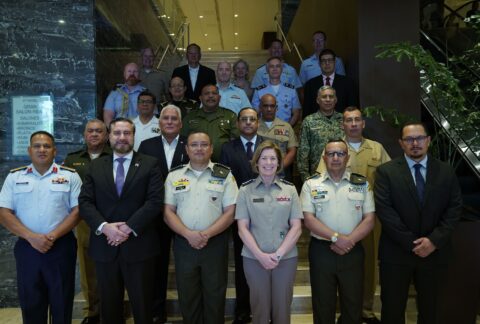It doesn’t matter how many times you look at it: It’s always impressive to see 23,000 pounds of cocaine and nearly 8,800 pounds of marijuana. That’s the amount of drugs — with a street value of over $411 million, according to U.S. authorities — the crew of the U.S. Coast Guard Cutter James offloaded on December 16, at Port Everglades, in Fort Lauderdale, Florida.
“This patrol highlights our crew’s continued commitment to protecting the American people from our adversaries,” said U.S. Coast Guard Captain Todd Vance, commanding officer of USCG James, during a press conference on the dock at Port Everglades. “Despite COVID, the James crew demonstrated supreme resilience, and the results of their exceptional performance are being showcased today.”

The drug busts were done with help from partner nations’ coast guards, including international crews from France, the Netherlands, and the United Kingdom. The drugs were interdicted in international waters of the Eastern Pacific Ocean off the coasts of Mexico, Central and South America, including contraband seized and recovered during 20 interdictions of suspected drug smuggling vessels.
“The [U.S.] Coast Guard’s strong international relationships, with key partners like the United Kingdom, France, and the Netherlands, along with our specialized capabilities and unmatched authorities, allow for a unity of effort to disrupt transnational criminal organizations, which threaten America and our partner nations,” asserted U.S. Coast Guard Commandant Admiral Karl Schultz.
According to the U.S. Coast Guard Public Affairs Office, during at-sea interdictions, a suspicious vessel is initially detected and monitored by allied, military, or law enforcement personnel, coordinated by Joint Interagency Task Force South based in Key West, Florida. The law enforcement phase of counter-smuggling operations in the Eastern Pacific is conducted under the authority of the Coast Guard’s 11th District, headquartered in Alameda, California. The interdictions, including actual boardings, are led and conducted by members of the U.S. Coast Guard.
“I am honored to be able to pay tribute to the successes of the team here today, and recognize the role the Royal Navy and U.K. National Crime Agency have played in this joint operation,” said Commodore Phil Nash, naval attaché at the United Kingdom Embassy in Washington. “Working seamlessly with U.S. and international colleagues, the presence of RFA [Royal Fleet Auxiliary] Argus has prevented the $54 million of drugs offloaded here from reaching the streets in the last few months; taken together with a wider effort this year by U.K. ships HMS Medway and RFA Mounts Bay, around $650 million of drugs have been stopped. This has been a genuine team effort — the key to success continues to be the close working relationship and collaboration between our nations.”
Also at the event were Colonel Jarst de Jong and Captain Cédric Chetaille, naval attachés from the Netherlands and France respectively; Jean-Sébastien Conty, a political counselor of African and Western Hemisphere Affairs from the French Embassy in Washington; and Paul Jenkins, head of region for North America and the Caribbean at the National Crime Agency.









